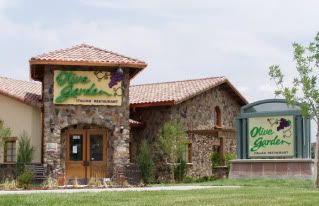
Read this article on Fast Company today: Why America Is Addicted To Olive Garden. Now, I don't own a major company, but if I did, I could certainly learn a few lessons from the people behind endless salad and breadsticks. The company, Darden, also owns Red Lobster.
Some fascinating tidbits:
The President of Olive Garden started out there as a line cook:
David Pickens, 53, the president of Olive Garden, knows firsthand how grueling -- and how fulfilling -- restaurant work can be. At 17, he started as a line cook at a Red Lobster in Nashville. The pace was relentless, the pay wasn't great, and he never saw the people he cooked for. It was just a job. Then he became a waiter, interacting with customers, shaping their dining experience, and getting rewarded for it. He set his sights on becoming a restaurant manager, got the job at 21, and never looked back, opening and overseeing restaurants for Red Lobster, Olive Garden, and the short-lived China Coast.Olive Garden sends its staff to Italy:
"I went from Nashville to Memphis to St. Louis to Evansville, Indiana, back to Nashville and Memphis and then to Little Rock to Houston to Philadelphia to New York and finally here to Orlando," says Pickens. "Got all that?"
Eleven times a year, the company sends 14 top employees, many of whom have never set foot in Italy, to spend a week in an 11th-century village in Tuscany and learn from Sergio and Daniela Zingarelli, a husband and wife who operate a restaurant, winery, and inn. The couple and other local experts expose the Americans to everything from how olive oil gets pressed to how to layer flavors in a Bolognese sauce. The Olive Garden employees buy fresh vegetables at a market in Florence and prepare a multicourse Italian meal.Red Lobster goes the extra mile:
"Is there Red Lobster without lobster?" is not an existential question for this company. The North American lobster harvest fluctuates every year, but demand continues to grow. So two years ago, Darden began sponsoring an experiment to boost the population. Scientists working with the government of New Brunswick, in Canada, catch pregnant lobsters and care for their offspring until they're mature enough to burrow into the ocean's sandy bottom, then release the tiny animals into the wild. Then Darden waits and hopes -- for six years or more. So far, says Bill Herzig, Darden's senior vice president of supply-chain innovation, "it looks like good science."Yes, Red Lobster actually raises baby lobsters, then releases them into the wild, and years later, captures them to put on your plate. That's commitment.
2 comments:
Cool entry...I'm reading the article right now because, believe it or not, my girlfriend and I are addicted to the place. Interesting perspective.
Seriously... who knew it took so much research and so many people to make sure I'm getting fresh breadsticks everytime?
Post a Comment